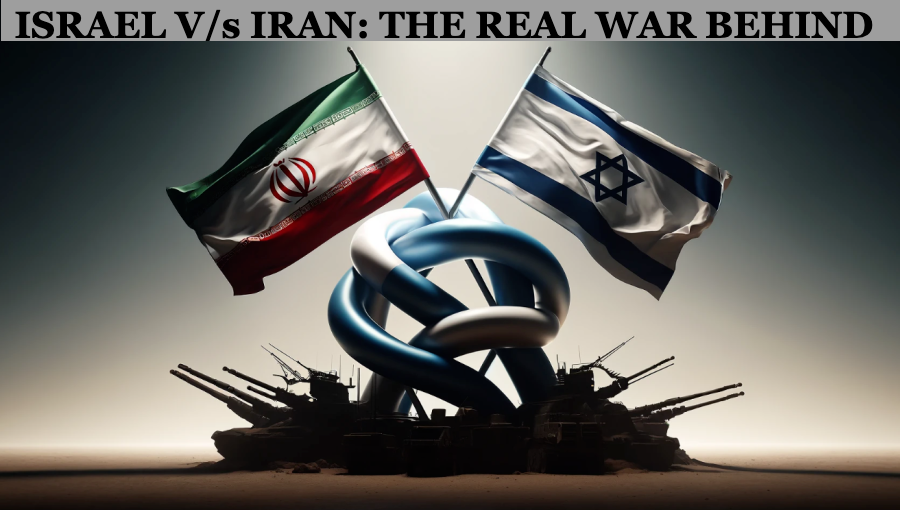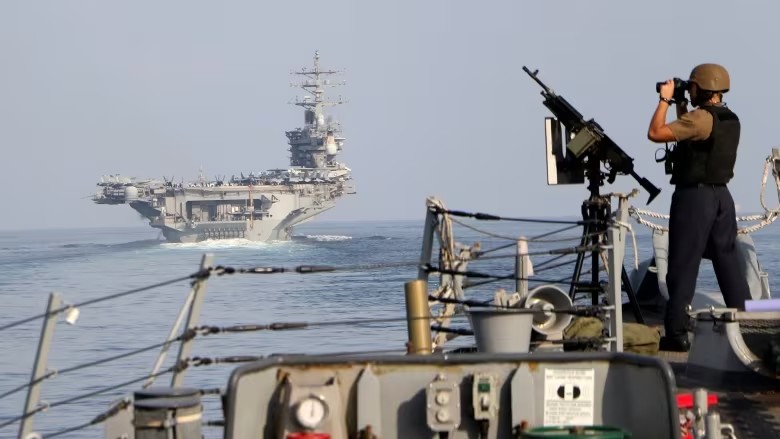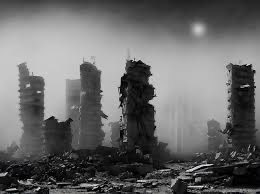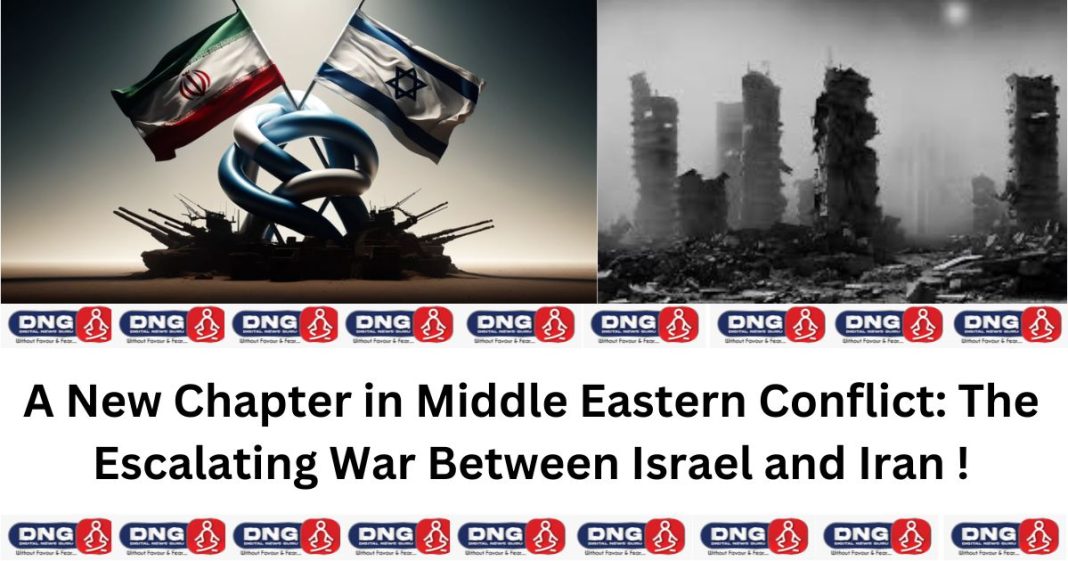A New Chapter in Middle Eastern Conflict: The Escalating War Between Israel and Iran !

The ongoing conflict between Israel and Iran has rapidly intensified in recent months, marking a significant escalation in a rivalry that has shaped the Middle East for decades. What began as a series of tit-for-tat attacks has grown into a broader confrontation with the potential to draw in multiple regional powers and destabilize the region further.
As both nations prepare for what could be a prolonged conflict, the world watches with increasing concern over the possibility of a large-scale war.
Key Factors Behind the Latest Escalation:

- Targeted Assassinations:
- Israel has allegedly conducted targeted killings of high-ranking members of Iranian-backed groups, including leaders from Hezbollah and Hamas. One of the most significant recent incidents was the assassination of Hamas leader Ismail Haniyeh in Tehran.
- Iran blames Israel for this strike, though Israel has not officially claimed responsibility. In retaliation, Iran and its allies, including Hezbollah, have vowed severe responses, raising fears of a broader conflict.
- Military Buildup and Proxy Warfare:
- Both Israel and Iran have been preparing for further confrontations. Israel has ramped up its military activities, particularly in Syria and Lebanon, where Iranian forces and Hezbollah are active. On the other hand, Iran has been mobilizing its proxies across the region, including in Lebanon, Iraq, and Syria, to respond to Israeli strikes. The involvement of these proxy groups heightens the risk of the conflict spreading across multiple fronts.
- Strategic Calculations:
- Israel perceives Iran’s expanding influence in Syria and Lebanon as an existential threat, particularly due to Iran’s support for Hezbollah and other militant groups positioned near Israel’s borders. To counter this, Israel has carried out numerous airstrikes targeting Iranian assets and allies in these regions.
- Iran, seeking to deter further Israeli actions and to avenge the killings of its operatives, has hinted at launching a more significant and sustained military response, which could include rocket and drone attacks on Israeli territory.
- International Dynamics:
- The United States and other Western nations have been closely monitoring the situation, with the U.S. expressing strong support for Israel while urging restraint on all sides.
- There is also concern that the conflict could draw in other regional actors, further destabilizing the Middle East. The U.S. has been involved in diplomatic efforts to prevent escalation, but with limited success so far.
Latest Developments:

- Escalation in Lebanon: Hezbollah has intensified its rocket attacks on northern Israel, leading to increased Israeli airstrikes on Hezbollah positions in southern Lebanon. The situation in Lebanon is particularly volatile, with both sides preparing for a possible large-scale conflict.
- Regional Responses: Countries like Britain have begun evacuating their embassy staff from Beirut, signaling fears of a wider regional war. There is also a growing international consensus that the conflict might not be contained to just Israel and Iran but could spread across the region.
The latest conflict between Israel and Iran is thus driven by a mix of strategic calculations, proxy warfare, and a series of provocative actions that have pushed both nations closer to open war. The situation remains highly fluid, with potential for further escalation if diplomatic efforts fail to de-escalate tensions.
The conflict between Israel and Iran is rooted in a complex mix of historical, ideological, and geopolitical factors that have intensified over several decades. Here are the primary reasons for the ongoing hostility:
- Ideological Differences and Mutual Hostility
- Religious and Political Ideologies: Iran’s Islamic Revolution in 1979 led to the establishment of a theocratic regime that viewed Israel as a symbol of Western influence and an illegitimate state. Iran’s leaders, especially under Ayatollah Khomeini, adopted an anti-Israel stance, calling for the “liberation” of Palestine and the destruction of Israel. This ideological hostility has persisted under subsequent Iranian leaders.
- Support for Opposing Factions: Iran supports various anti-Israel militant groups, such as Hezbollah in Lebanon and Hamas in Gaza, which have engaged in direct conflicts with Israel. Israel views this support as a direct threat to its security.
- Regional Power Struggle
- Influence in the Middle East: Both Israel and Iran seek to expand their influence in the Middle East. Iran’s involvement in Syria, Iraq, Lebanon, and Yemen is seen by Israel as an attempt to encircle and threaten it. Conversely, Israel’s actions, such as forming alliances with Arab states and conducting military operations against Iranian forces in Syria, are perceived by Iran as efforts to curb its influence.
- Nuclear Ambitions: Israel is strongly opposed to Iran’s nuclear program, which it believes is aimed at developing nuclear weapons. Israel sees a nuclear-armed Iran as an existential threat, given Tehran’s hostile rhetoric and support for anti-Israel groups. This has led Israel to take preemptive actions, including cyberattacks, assassinations of nuclear scientists, and lobbying for international sanctions against Iran.
- Military Conflicts and Proxy Wars
- Syria and Lebanon: The Syrian Civil War has brought Israeli and Iranian forces into closer proximity, with Iran deploying troops and establishing military bases in Syria. Israel has conducted numerous airstrikes against Iranian targets in Syria to prevent the establishment of a permanent Iranian military presence near its borders. In Lebanon, Iran’s support for Hezbollah has led to periodic conflicts between Israel and this powerful militant group.
- Recent Escalations: The assassination of Iranian military leaders, allegedly by Israel, and Iran’s retaliatory strikes have intensified the conflict. These acts are part of a broader pattern of covert and overt actions by both nations to weaken each other’s strategic positions.
- Global Alliances and Diplomacy
- U.S. Involvement: The United States is a key ally of Israel and has provided significant military and diplomatic support. U.S. policies, including sanctions on Iran and the withdrawal from the Iran nuclear deal (JCPOA), have exacerbated tensions. Iran views Israel as an extension of U.S. power in the region, further deepening its animosity.
- Arab-Israeli Rapprochement: The normalization of relations between Israel and several Arab states (e.g., UAE, Bahrain, and Morocco) through the Abraham Accords is seen by Iran as a threat to its influence in the Arab world. This has led to further regional polarization, with Iran seeking to counterbalance these alliances by strengthening ties with non-Arab allies and proxies.
- Historical Grievances
-
Historical Enmity:

- The enmity between Israel and Iran also has historical roots. Before the 1979 Iranian Revolution, Israel and Iran had relatively good relations, but the revolution marked a sharp turn towards hostility. The historical grievances, including territorial disputes in the broader Middle Eastern context, also play a role in the animosity.
The conflict between Israel and Iran is therefore driven by a combination of ideological opposition, geopolitical rivalry, military conflicts, and alliances that have only deepened over time. These factors create a volatile and dangerous situation that continues to shape the politics and security of the Middle East.
The latest developments in the escalating conflict between Israel and Iran indicate a serious and potentially catastrophic situation in the Middle East. Tensions have significantly risen following Israel’s assassination of senior Hamas leader Ismail Haniyeh in Tehran, which Iran attributes to Israeli operatives. This action has been condemned by Iran and its allies, and there are widespread concerns that it might trigger a broader regional conflict.
The Israeli Defense Forces (IDF) have been on high alert, particularly in anticipation of retaliatory attacks from Iran and its regional proxies, including Hezbollah in Lebanon. Hezbollah has already launched numerous rocket attacks into northern Israel, resulting in casualties and significant damage, despite Israel’s Iron Dome defense system intercepting many of the projectiles.
In addition to the direct military exchanges, both sides have engaged in diplomatic maneuvers. Iran has vowed to “harshly punish” Israel, with Iranian officials and military leaders stating their intent to escalate their response if further Israeli actions continue.
The West Bank has also seen an increase in violence, with Palestinian militias conducting attacks against Israeli forces. This rise in hostilities comes as part of a broader strategy by Iran and its allies to open multiple fronts against Israel, aiming to stretch Israeli military resources thin and increase pressure on the Israeli government.
As of now, the situation remains highly volatile, with both sides preparing for the possibility of a more extensive conflict. The international community, including the G7, has called for restraint and de-escalation, but the chances of a peaceful resolution appear slim as military actions continue on both sides.
The coming days will be critical in determining whether the conflict will spiral into a full-scale war or if diplomatic efforts can somehow deescalate the situation.
YOU MAY ALSO READ :- Sara ali khan birthday special : नवाब परिवार में हुआ है सारा अली खान का जन्म, सारा को बचपन से ही था अभिनेत्री बनने का शौक !








